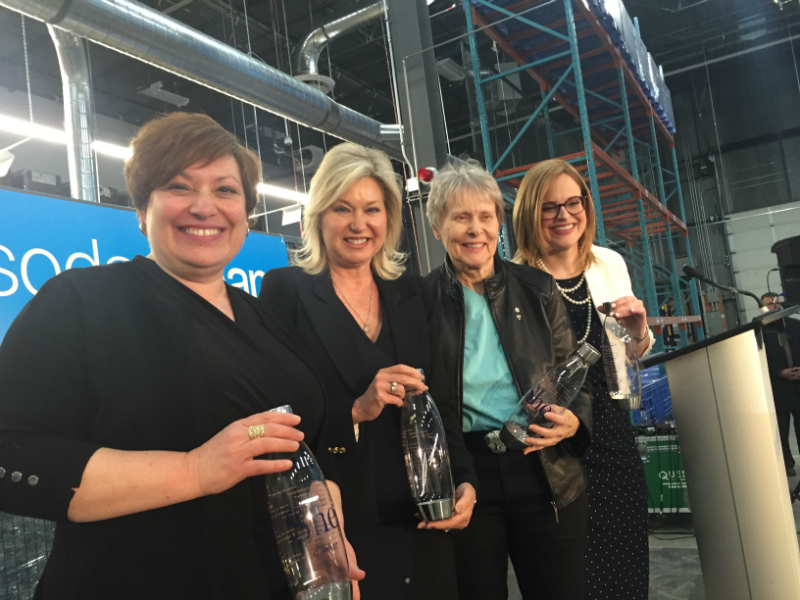Advancing the long and close relationship between Jews and seltzer, Israel-based soda maker SodaStream has cut the ribbon to a plant in Mississauga that will refill its bubble-producing gas cylinders and continue the company’s mission to reduce plastic waste.
Dignitaries gathered March 5 to open the 18,500 square-foot plant on Annagem Blvd., which will create up to 28 jobs.
Ontario Premier Doug Ford, Israeli Consul General for Israel and Western Canada Galit Baram, and Dr. Roberta Bondar, the first Canadian woman in space, rubbed shoulders with elected officials as they toured the facility and sampled the fizzy goods.
The plant will eliminate the need to ship spent CO2 carbonators from Canada to New Jersey for recharging, company officials said.
SodaStream has been a big hit in Canada, they added. Since 2010, 1.5 million home carbonation machines, five million gas cylinders, and 7.5 million flavour mixes have been sold in this country. The Canadian subsidiary has grown by 45 per cent in each of the last three years, and Canada is the fourth largest SodaStream market in the world, Rena Nickerson, general manager for Canada, told The CJN.
The machines are now available in 2,000 stores across Canada, she added.
“The Canadian business is on fire,” the company’s chief executive Daniel Birnbaum told the Financial Post recently. The company says six per cent of Canadian households have one of the countertop machines.
Nickerson and others stressed the environmental benefits of the beverage makers: last year, Canadian customers replaced up to 217 million single-use plastic bottles and cans, according to a company handout.
In her remarks welcoming the company to her city, Mississauga Mayor Bonnie Crombie recalled her trip last November to Israel, where she visited SodaStream’s head office in Lod, southeast of Tel Aviv, at a location dubbed “Island of Peace,” owing to the company’s policy of hiring Palestinians, Jews and Bedouins.
She said the trip “had a real impact on me.” The workforce’s ethnic and religious mix is “remarkable.”
She mentioned the words printed on each SodaStream box: “This product is produced by Arabs and Jews working side-by-side in peace and harmony.”
Asked Crombie: “Sounds controversial? It’s revolutionary. Seeing the success of SodaStream with my own eyes, I saw a model that other companies in the region and globally should adopt. SodaStream is changing the world.”
It was a sentiment echoed by Bondar, now an environmental activist, who said the company “sends a positive message” for its effort to reduce single-use plastic containers.
READ: SODASTREAM OFFERS TO EMPLOY SYRIAN REFUGEES
Baram called the ribbon-cutting “an exciting day in Israel-Ontario relations,” and said SodaStream “represents the beauty of Israeli society in its colourful tapestry.”
Baram, Crombie, and Bondar were presented with limited edition “She Changed the World” bottles to mark International Women’s Day on March 8, and to honour “the inspirational achievements of iconic, strong, women trailblazers.”
In his remarks, Ford praised SodaStream for fitting with his government’s motto of “Ontario is open for business.”
For years, SodaStream was a favourite target of the anti-Israel boycott, divestment and sanctions (BDS) movement. Actor Scarlett Johansson was attacked for being the company’s spokesperson, and in 2015, SodaStream shut its factory in Mishor Adumim, an industrial park in the West Bank.
BDS advocates hailed it as a victory but the company said the move cost hundreds of Palestinians their well-paying jobs.
Last year, PepsiCo acquired SodaStream for US$3.2 billion, an especially effervescent development, given that the soft drink giant boycotted Israel until the early 1990s.
